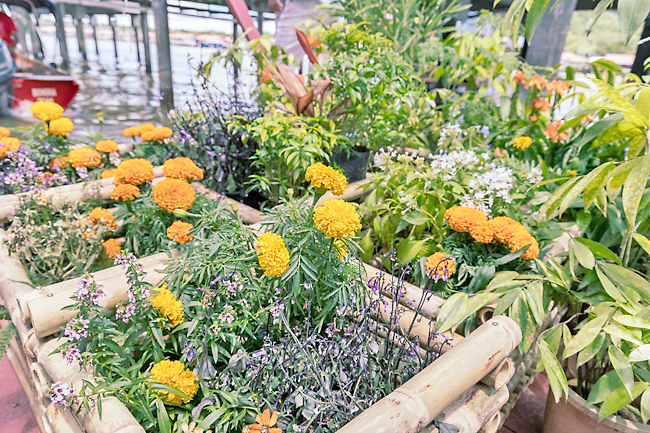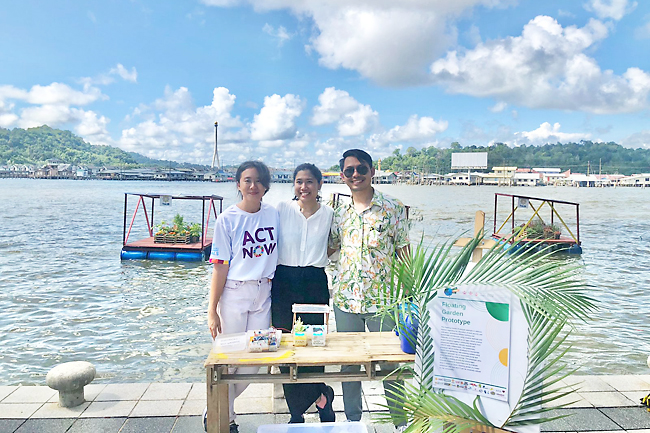Izah Azahari
As the Sultanate commits to strengthening the food system, with food security still a major concern with growing global pressure, especially during the pandemic, a group of youth have banded together through a Citizens Science Project to create a floating garden prototype.
The prototype was revealed during the launch of the Eco Festival last Sunday in the capital, and the Bulletin had the opportunity to speak with its project co-coordinator Hafizah Nor.
Hafizah said the project attempts to address food security, especially for the people of Kampong Ayer, through education in food cultivation.
“We want to educate the people living there that they could hopefully farm efficiently using the system that we’re working on,” she said.
She added that the prototype uses sustainable and recycled materials, such as bamboo and recycled plastic barrels, in the hopes of also educating individuals on sustain-able building.
The project was initially part of Hafizah’s dissertation in 2020.


She said she has always been passionate about floating settlements and architecture. After meeting another person with a similar interest, they decided to embark on a journey to build something beneficial.
“It took us about two months,” she said, on how long it took to get the prototype off the ground.
There are six to eight people on their team working to improve the floating garden, ranging from an architect to a social entrepreneur, a marine biologist, an environmentalist specialising in agriculture, someone from the solar energy industry, and a carpenter.
“The prototype was built by a carpenter in Kampong Bolkiah, to capture the idea of community work towards sustainability,” said Hafizah.
She shared that the prototype is still in its rudimentary form and needs further development.
So far, she added, they have worked on the designs of the self-watering and lighting systems.
Hafizah explained that the floating gardens collect rain water which goes through pipes that store it in a reservoir. The water is then disseminated to the plants using a wicking system.
“It can either be watered manually or on its own using the self-watering system,” she added.
The night prior to the launch of the Eco Festival, Hafizah enthused about the community effort involved in the project.
“We saw a lot of people coming together, and last night as we were setting up, the people of Kampong Ayer were helping us tie the floating garden. It was pretty amazing,” exclaimed the project co-coordinator.
She said that, for her, it isn’t just the result that is important, but also the process of how something can be achieved with the collaboration of a community.
Hafizah said they have yet to approach anyone in Kampong Ayer to try out the prototype as it was only launched a couple of weeks ago.
She went on to say that in the long-term, the team will put the floating garden prototype at the Kampong Bolkiah ‘B’ Community Centre as the testing ground for creative thinkers to come and experiment, as well as think of how to make it more efficient and effective. “We see this as a long-term community project that transcends boundaries and borders in aspects of an ASEAN-wide collaboration, as it could possibly be replicated not just in Kampong Ayer, but also other water settlements all over the world,” Hafizah said.
She said as they are only just starting out, she calls on interested parties to get in touch with them to do something great about it.
“That means anyone from the community, who is passionate and has the skills to help us with this project. It’s not connected to any specific company, as it is just a group of passionate individuals,” she added.
The current prototype is sponsored by Perbadanan Tabung Amanah Islam Brunei (Perbadanan TAIB) and was placed at the Yayasan Sultan Haji Hassanal Bolkiah Jetty in the capital for a whole day on Sunday before getting towed back to the community centre.
“If people want to see it, they can go to the Kampong Bolkiah ‘B’ Community Centre,” Hafizah said.
“We would love for more people to take a closer look at (the prototype).”


